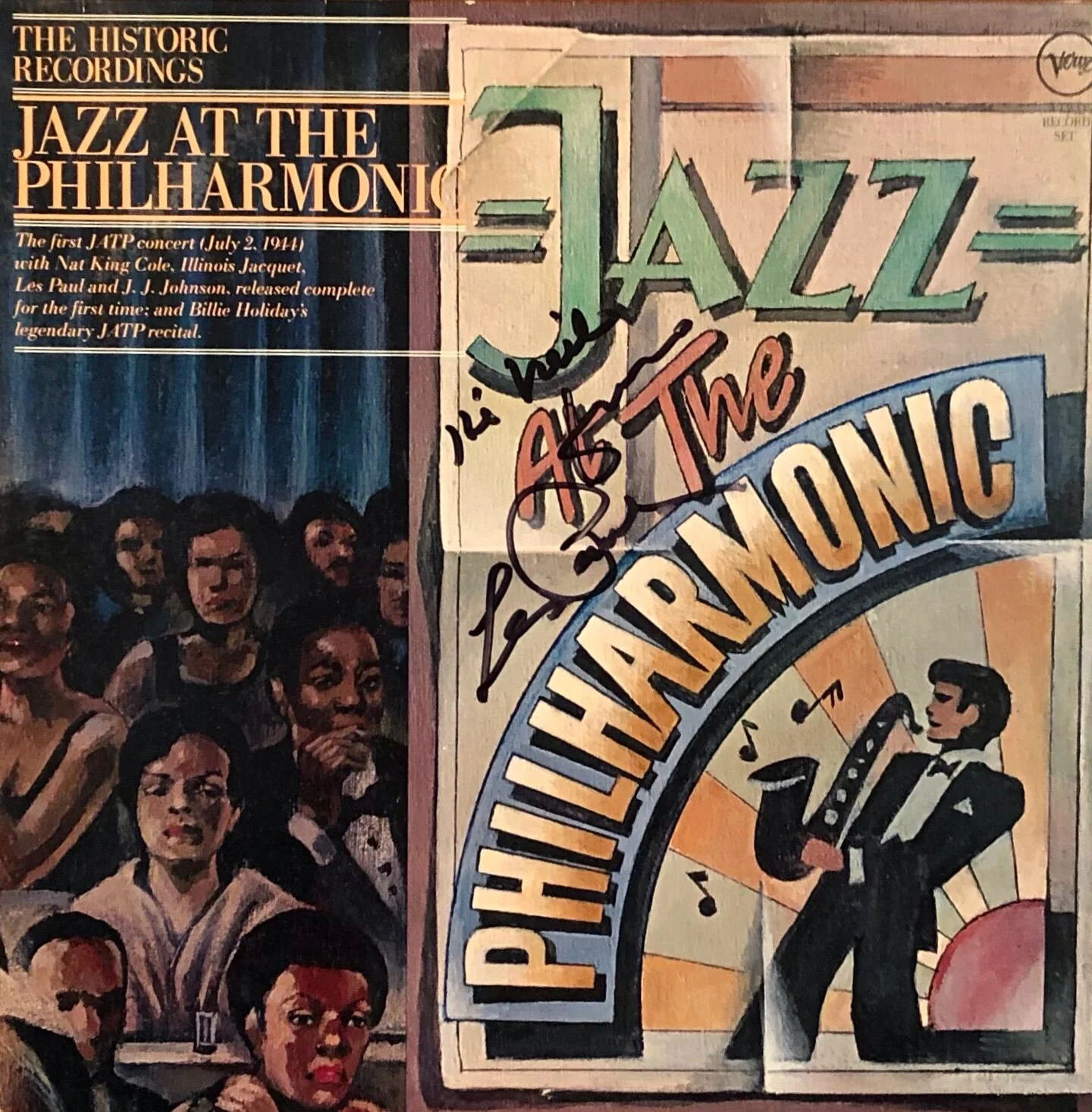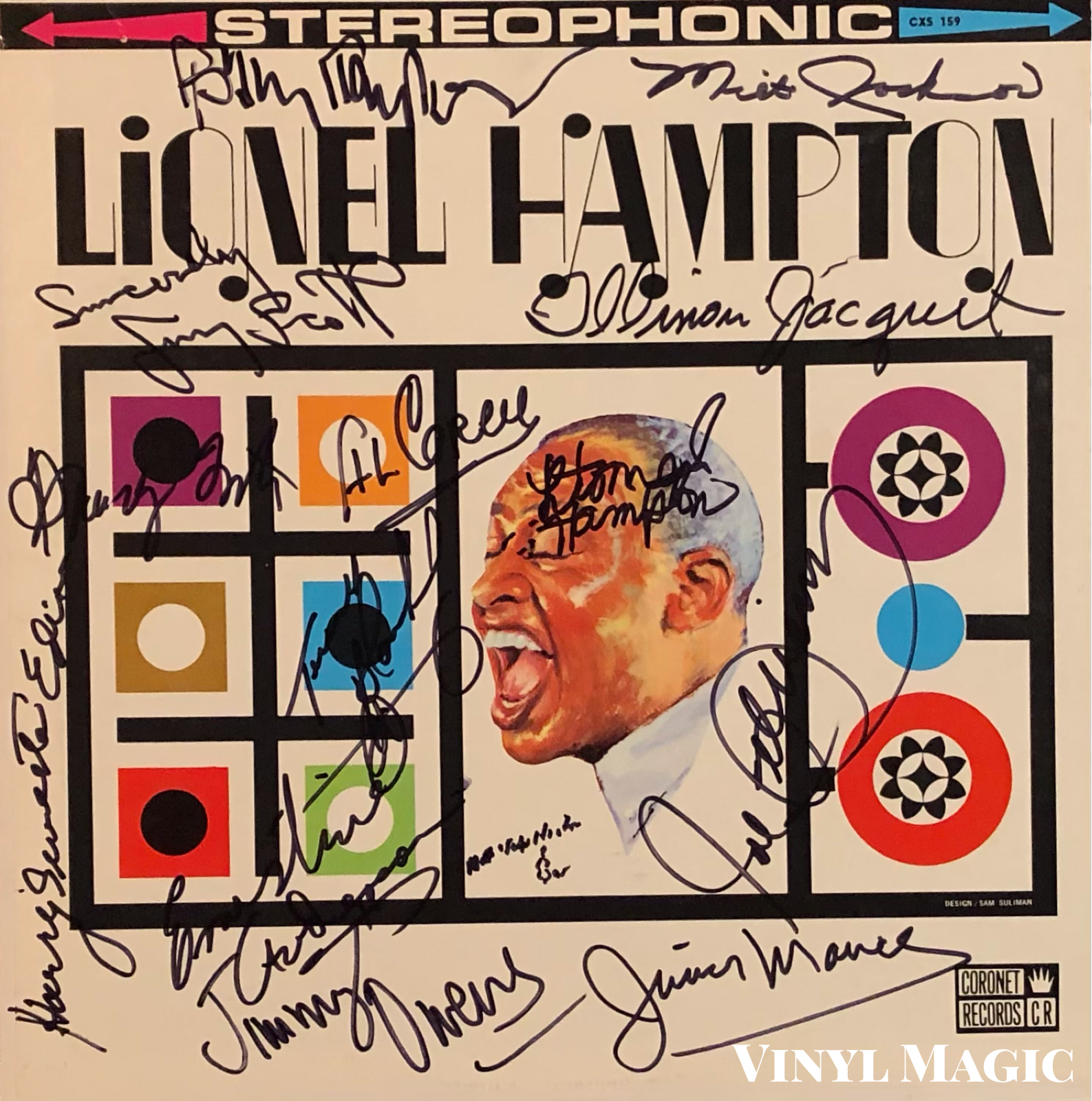Illinois Jacquet, Lionel Hampton and Me...
People like to hear songs that they can dance to. Even if they're sitting, they like being made to want to dance and move. By me being a dancer, I know how I'd dance at certain tempos. I was always good at it. Hamp would ask me about tempos in the band. 'Jacquet," he'd say, 'knock off that tempo.' A lot of jazz musicians didn't prefer to play for dancers, which was their loss, really. But good jazz has always had that dance feel.
Illinois Jacquet
Swing’s The Thing (1956) signed by Illinois Jacquet
Jazz music is deeper than people think. It is a spiritual form of art. It's like a Picasso painting. There's no such thing as art going out of style.
Illinois Jacquet
King Jacquet (1947-1950 recordings, 1977 release) signed by Illinois
He was a great balladeer -- I would say one of the greatest. He just never got the credit he deserved.saxophonist Houston Person
Illinois Jacquet Flies Again (1966) signed by Illinois
The ballad is the most demanding test of jazz performers. Musicians playing ballads require an exceptional ear. The instrumentalist must possess a full, rich tonal quality that comes only after long training. When I play a ballad, I approach it the way a singer would. I read the lyrics over and over and then I try to interpret their meaning through my instrument... the ballad soothes the heart when properly played. It is supposed to induce romance. And there is a great need for peace in our world, and for love.
Illinois Jacquet, liner notes, Bosses Of The Ballad (1964)
Bosses Of The Ballad (1964) signed by Illinois, Benny Golson
Although most people have never heard of him, Jean-Baptiste "Illinois" Jacquet is one of the founding fathers of rhythm and blues and rock and roll. His honking and braying tenor saxophone solo recorded in 1942 as a nineteen year old on Lionel Hampton's "Flying Home" is considered by many musicologists to be the advent of rhythm and blues and a harbinger of rock and roll. Written by Lionel Hampton and Benny Goodman, "Flying Home" became a tour de force at Hampton's concerts and usually concluded with an extended blowing and honking session. Illinois Jacquet, Arnett Cobb, and Dexter Gordon were among those honking and blowing through the years while performing with Hampton's big bands, but Illinois was the first soloist and the most widely copied. As he once said, "We were born with the rhythm and raised on the blues. If you can't play the blues, you're not a jazz musician."
Viberations (1944 recordings) signed by Illinois, Lionel Hampton
Though born in Louisiana, Illinois was raised in Houston, Texas. He became a proponent of the 'Texas Tenor' sound: brawny, muscular, rough-hewn, and drenched in the blues. Not the later avant garde screeching of Albert Ayler or the musings of Ornette Coleman, but the deep, raw, robust sounds of Arnett Cobb, David "Fathead" Newman and King Curtis, all Texans singularly influenced by Illinois Jacquet. After leaving Lionel Hampton in 1943, Illinois joined Cab Calloway, appeared in the movie Stormy Weather, and then joined Count Basie's orchestra where he recorded "The King" and "Mutton Leg", two enduring hits.
Jazz At The Philharmonic (1944 recordings) signed by Les Paul
In 1944, Illinois participated in the first Jazz At The Philharmonic (JATP) concert at the Philharmonic Auditorium in Los Angeles. JATP was the brainchild of jazz impresario Norman Granz, and many tours and concerts followed in the ensuing years (1944-1983) when JATP was (intermittently) active. At the first JATP, Illinois was one of the strongest performers along with Les Paul and Nat King Cole. It is revelatory to listen to "Blues", a ten minute jam where Les Paul and Nat King Cole trade riffs, J.J. Johnson supplies gut bucket bottom swirls on trombone, and Illinois comes over the top with his blazing tenor saxophone. The recording is more than seventy years old and still sounds as fresh and vital as ever. As bassist Keter Betts wisely observed about Illinois, "He was Mr. Excitement. You didn't sit back in your chair, you sat on the edge." JATP sessions evolved into cutting duels through the years between artists as revered as Benny Carter, Charlie Parker, Lester Young, Dizzy Gillespie, and Harry "Sweets" Edison, and many records were released under the imprimatur of Norman Granz who helped to burnish the reputations of these great jazz masters. As the cost of touring with a big band became too prohibitive, Illinois recorded some great sides with smaller quintets in the 1950s and 1960s.
Bottoms Up (1968) signed by Illinois, Barry Harris
A composer of three hundred songs, "Black Velvet", "Bottoms Up", "Port Of Rico" and "Robbins Nest" among his most well known, Illinois was a musician's musician, an arranger and big band leader who also re-introduced the bassoon into Jazz. A difficult woodwind, mostly relegated to the concertos of Bach, Mozart and Vivaldi, Illinois studied privately with Manuel Ziegler of the New York Philharmonic and practiced for nearly five years before performing "Bassoon Blues" on The Message (released in 1963). It was the first Jazz recording to feature a bassoon since Frankie Trumbauer in 1928. Most of Illinois' later recordings featured a bassoon track and one highlight was his soulful and haunting rendition of Thelonious Monk's "Round Midnight" on his 1969 album, The Blues, That's Me! And Illinois is unquestionably the only jazz artist to play at The White House for Presidents Carter, Reagan and Clinton, even performing alongside President Clinton in 1993 on a bluesy rendition of Duke Ellington's classic "C Jam Blues."
The Message (1963) signed by Illinois
Erin and I saw Illinois and his big band several times, including a show at The Tavern On The Green in New York City's Central Park which was a memorable if short lived jazz venue. Built originally in 1870 to house the sheep that grazed in a more bucolic and pastoral 19th century Central Park, The Tavern On The Green was transformed in 1934 under Robert Moses' leadership and became one of the largest and most successful restaurants in the country. It was a sprawling space which sat over 800 patrons in several banquet rooms and it became a cultural film icon when Bud Fox sauntered through the dining room after a clandestine meeting with Gordon Gekko in Wall Street in 1987. The Tavern took one of their spacious rooms and turned it into a jazz supper club and we went to see Illinois in the mid-1990s when he was playing a month long residency.
Lionel Hampton (1961) signed by Illinois, Lionel, Jimmy Owens, Junior Mance, Harry “Sweets” Edison, Al Grey, Joe Williams, Milt Jackson, Billy Taylor, Jimmy Scott, Ernestine Anderson, Milt Hinton, Terrence. Blanchard, Grady Tate
The consummate show man, Illinois possessed infinite talent and an abundance of good cheer. His band was sixteen pieces: piano, drums, bass, five saxophones, four trombones, and four trumpets. It was a wall of sound and wonder. The arrangements were tight, the soloing crisp and adventurous, and the ringmaster was Illinois Jacquet, leading the band through the changes, directing soloists, and stepping up to deliver his warm, impassioned tenor sax solos with reckless enthusiasm. As he said so presciently, "The patterns of big-band music are smooth and classical. It's got to be fresh. The brass section should crackle, like the sound of eggs being dropped into hot grease." And those horns were fresh, cracklin' and greasy!
Birthday Party (1976) signed by Illinois
He was happy to sign albums after each show. As powerful as his sound was on stage, Illinois was diminutive off stage, impish with a forever twinkle in his eyes and nattily attired. He was so full of joy and wonderment and he seemed particularly enamored with Erin, not the first musician, nor the last. At least he didn't ask her to sit in his lap like Les McCann or Solomon Burke! And I still don't know what happened in James Brown's dressing room....
Illinois used to introduce Milt Buckner, the venerable jazz organist and fellow bandmate, at his concerts as "the man who made Lionel Hampton rich - after I made him wealthy." We were the lucky ones to witness Illinois' musicality, joy and artistry, seeing him was a rich and wealthy experience for sure.
Illinois Jacquet, such fresh sounds and how those horns crackle!
The Blues, That’s Me (1969) front cover signed by Buster Williams
Back Cover signed by Illinois
Choice Illinois Jacquet Cuts (per BK's request)
“Blues” Illinois on tenor saxophone, Les Paul on guitar, Nat King Cole on piano, JJ Johnson on trombone
https://www.youtube.com/watch?v=dMOL454T4Gg
"Flying Home" - Budd Johnson, Dexter Gordon, Illinois Jacquet - in order of tenor sax solos
https://www.youtube.com/watch?v=xtbzCXbLv6Q&ebc=ANyPxKp37-Uqi9I5dlYoWy4mNC9lsjHLuKhq-WnSLLwybHPpLxKMYKuNn36JvI70K5OMvEy4jixwb6jv0UuaZAO7K9BMo4OAeA
"Round Midnight" - The Blues That's Me!
https://www.youtube.com/watch?v=Ixc2BNuTURM
"Take The 'A' Train" - Illinois Jacquet Big Band
https://www.youtube.com/watch?v=pcbOH9EheZI
"I Wish I Knew How It Would Feel To Be Free" - The King
https://www.youtube.com/watch?v=V_AGgG-mAv4
"Flying Home"











